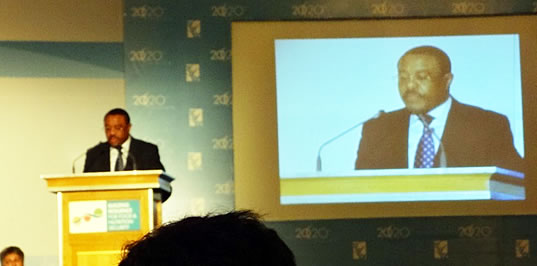 The conference discussed a wide range of topics toward helping people, communities and countries cope with and recover from shocks like extreme weather events, natural disasters, financial crises, food price spikes, emerging diseases, and contaminated foods.
The conference discussed a wide range of topics toward helping people, communities and countries cope with and recover from shocks like extreme weather events, natural disasters, financial crises, food price spikes, emerging diseases, and contaminated foods.
The global meeting had 12 plenary sessions including the inaugural session; 15 parallel sessions, 21 parallel side events, 17 rapid-fire presentations, and a knowledge fair that featured various types of publications, 33 videos, and e-posters by 66 contributors. It distributed 19 commissioned briefs covering the various topics of the conference, produced nine papers, and additional resources found in the conference website www.2020resilience.ifpri.info/.
IFPRI is the food policy research agency of the Consultative Group on International Agricultural Research (CGIAR) and is based in Washington, D.C. Its 2020 Vision is a world where every person has access to sufficient food to sustain a healthy and productive life, where malnutrition is absent, and where food originates from efficient, effective, and low-cost food systems that are compatible with sustainable use of natural resources. (Maria Celeste H. Cadiz)
![Dr. Saguiguit and Ms. Adoracion T. Robles, SEARCA Executive Coordinator, listen to the Inaugural Address of H.E. Hailemariam Dessalegn, Prime Minister of Ethiopia (below) at the IFPRI Conference on Building Resilience for Food and Nutrition Security, 15-17 May 2014, Addis Ababa, Ethiopia. [br] (Photos by Dr. Maria Celeste H. Cadiz, Program Head, KM)](/images/stories/news2014/may/searca-participates-in-global-conference-on-building-resilience-for-food-and-nutrition-security.jpg)